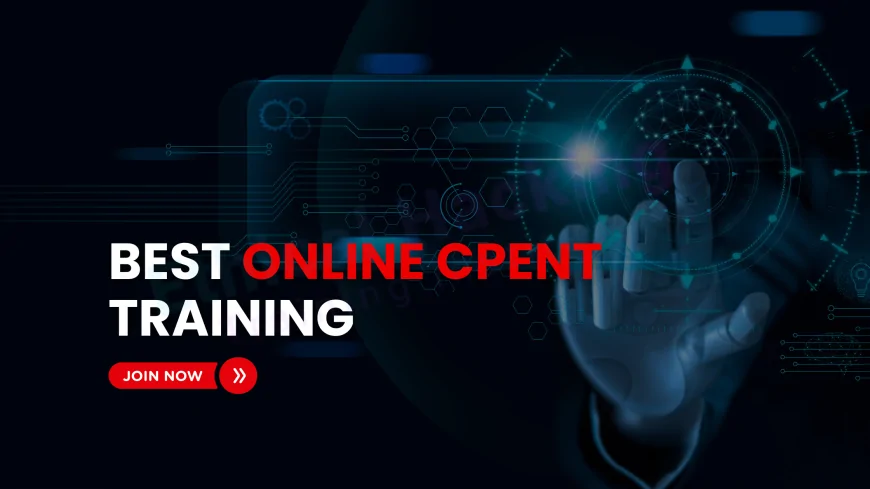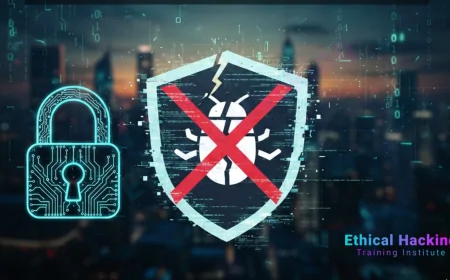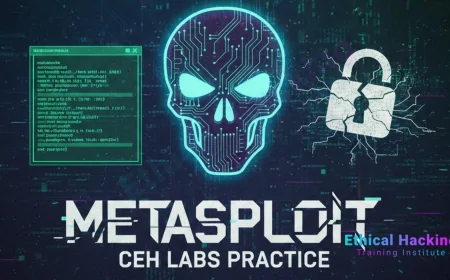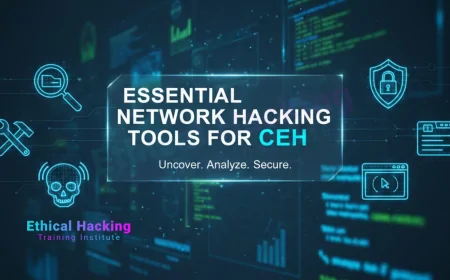Best Online CPENT Training with Hands On Labs for Advanced Penetration Testing Skills
Master advanced penetration testing with the best online CPENT training featuring hands-on labs, real-world cyber ranges, and interactive exercises. Elevate your ethical hacking skills and prepare for CPENT certification success.

Imagine a cyber war room. Lights are low. Monitors flash with live traffic. A skilled professional launches a simulated attack on a hardened server. The purpose? To test, break, report, and defend—ethically. That’s the world of the Certified Penetration Testing Professional (CPENT), a certification crafted not for beginners, but for elite cyber warriors. And in today’s digital-first world, online CPENT training with hands-on labs is not just available—it’s the smart choice.
Whether you’re a red team aspirant, a penetration tester leveling up, or a security analyst looking to break boundaries, this guide will walk you through everything you need to know about CPENT online training—with zero fluff and full of practical insights.
What is CPENT?
CPENT (Certified Penetration Testing Professional) is a high-level certification designed to test advanced penetration testing techniques in a real-world, simulated cyber environment.
What Makes CPENT Unique?
-
Live range exams instead of theory-based tests
-
Covers internal and external attacks
-
Advanced exploitation, binary analysis, and pivoting
-
Includes privilege escalation, evading defenses, cloud penetration testing, and IoT attacks
-
Real-time network attack simulations and lateral movement exercises
If traditional certifications teach you how to hack, CPENT teaches you how to think like an adversary—while staying ethical.
Why Choose Online CPENT Training?
1. Anywhere, Anytime Access
No commuting. No rigid schedules. You can train from your bedroom or your office, across time zones. Online CPENT training gives unmatched flexibility to balance your job, studies, or family life.
2. Replicates Real-World Attacks
Top-tier online CPENT programs offer hands-on labs simulating enterprise-grade networks. You don’t just read theory—you attack, exploit, and defend in a controlled but intense environment.
3. Cost-Effective Learning
Compared to on-premise bootcamps, online courses slash travel, accommodation, and logistical costs. You invest more in skills, not logistics.
4. Progress at Your Pace
Most online platforms allow self-paced modules. If buffer overflows scare you, you can pause, practice, and proceed without pressure.
Who Should Take Online CPENT Training?
-
Certified Ethical Hackers (CEH)
-
Security Engineers
-
Red Team Operators
-
SOC Analysts and Threat Hunters
-
Penetration Testers looking to upgrade
-
Cybersecurity professionals preparing for offensive security roles
If you already have intermediate experience and want to dive deep into enterprise-level exploitation, CPENT is your next logical step.
What You’ll Learn in CPENT Online Training (Module-Wise Breakdown)
Here’s a sample module roadmap typically covered in a structured online CPENT training course:
1. Advanced Penetration Testing Techniques
-
Evading antivirus and EDR
-
Fileless malware attacks
-
DLL injection and process hollowing
2. Binary Exploitation
-
Stack-based buffer overflows
-
SEH and egghunter techniques
-
Manual shellcode writing
3. Privilege Escalation Techniques
-
Windows token manipulation
-
Linux kernel exploit simulation
-
SUID abuse and cron jobs
4. Active Directory Pen Testing
-
Kerberoasting and golden ticket attacks
-
AD enumeration via PowerShell
-
Lateral movement and persistence
5. Web Application Pen Testing
-
Manual testing of XSS, SQLi, and RCE
-
JWT, SSRF, and web cache poisoning
-
Server misconfiguration exploits
6. Wireless and IoT Security
-
WPA/WPA2 cracking
-
Bluetooth attacks
-
IoT firmware reverse engineering
7. Cloud Penetration Testing
-
Exploiting IAM misconfigurations
-
Attacking AWS/GCP resources
-
Privilege escalation in cloud services
8. Writing Professional Penetration Testing Reports
-
Evidence capture
-
Risk categorization
-
Executive summaries and technical detailing
Each of these modules integrates real-world challenges that test your skills beyond conventional hacking certifications.
Hands-On Labs: Where the Real Magic Happens
What Are CPENT Hands-On Labs?
They are simulated enterprise-grade networks that mimic real-world environments—often with 50+ machines, firewalls, detection systems, and layered security.
Features to Look For in a Lab:
-
Real-Time Scenarios: Enterprise-grade simulations of banks, e-commerce, and government servers.
-
Multi-Layered Networks: DMZ, internal LAN, and segmented architecture.
-
Live Monitoring & Feedback: Instant result evaluations, hints, and attack paths.
-
Auto-Provisioned Environments: Reset anytime to retry scenarios.
Lab-Based Challenges Often Include:
-
Pivoting from one compromised system to another
-
Exploiting misconfigured AD policies
-
Gaining root access using local exploits
-
Man-in-the-middle (MITM) attacks across segmented networks
This isn’t just play; it’s preparation for real-world engagements.
Key Skills You’ll Master by the End of CPENT Training
-
Advanced Red Teaming
-
Binary & Exploit Development
-
Manual Vulnerability Assessment
-
Cloud Attack Simulation
-
AD Forest Exploitation
-
Cross-Platform Privilege Escalation
-
Report Writing & Communication with Stakeholders
CPENT teaches you how to penetrate AND communicate—a rare combination in cybersecurity training.
Benefits of Online CPENT Training with Labs
| Benefit | Description |
|---|---|
| Practical Mastery | Real-world tasks instead of multiple-choice questions |
| Remote Access | Train from anywhere using a browser |
| On-Demand Learning | Revisit modules as many times as needed |
| Simulated Attack Range | Test skills in real-time under adversarial pressure |
| Career Acceleration | Prepares you for Red Team, SOC, and Threat Hunting roles |
| Interactive Support | Forums, mentors, and peer community |
CPENT Exam: What to Expect
-
Duration: 24-hour practical exam (2 x 12 hours segments)
-
Environment: Live cyber range
-
Scoring Criteria:
-
Minimum 70% for CPENT Certification
-
90%+ for LPT (Master) Certification
-
The exam challenges are designed to simulate real penetration tests—so everything you practice in your hands-on lab gets directly tested.
How to Choose the Best Online CPENT Training
Key Selection Criteria:
-
Self-Paced Learning + Instructor Support
-
Real Hands-On Labs (Cloud-based)
-
Practice Exams & Scenario-Based Challenges
-
Updated Curriculum aligned with CPENT blueprint
-
Lifetime Access or Extended Lab Hours
-
Dedicated Support & Active Learner Community
Avoid providers that only focus on pre-recorded videos without live labs or mentorship—they miss the essence of CPENT.
Career Opportunities After CPENT Certification
Roles You Can Aim For:
-
Red Team Analyst
-
Cybersecurity Consultant
-
Exploit Developer
-
Cloud Security Engineer
-
SOC Level 3 Analyst
-
Threat Hunter
-
Vulnerability Researcher
Salary Expectations (2025 Estimates):
-
Entry-Level Pen Tester: $70,000 – $90,000/year
-
Mid-Level Security Analyst: $100,000 – $130,000/year
-
Red Team Lead: $140,000 – $180,000/year
Certification + practical exposure = higher job opportunities and negotiation power.
Daily Practice Strategy for Success
| Day | Focus Area |
|---|---|
| Day 1–3 | Intro to labs + basic exploit practice |
| Day 4–7 | Binary exploitation and privilege escalation |
| Day 8–11 | AD and Windows domain attacks |
| Day 12–15 | Cloud and IoT labs |
| Day 16–18 | Full lab simulation and challenge solving |
| Day 19–20 | Report writing practice |
| Day 21–24 | Mock exam and revision |
Top Mistakes to Avoid During CPENT Training
-
Skipping hands-on labs and just watching theory videos
-
Ignoring report writing and communication practice
-
Memorizing tools instead of understanding techniques
-
Not simulating full penetration test cycles
-
Underestimating binary exploitation modules
Train smart. Focus on why an attack works, not just how.
FAQ's
1. What is CPENT training?
CPENT is an advanced penetration testing certification that focuses on real-world cyberattack simulations and teaches professionals how to ethically test and defend enterprise systems.
2. Is online CPENT training effective?
Yes, especially when it includes hands-on labs. Online platforms allow practical, real-time attack simulations that prepare you for the CPENT exam and real-world roles.
3. Do I need CEH before CPENT?
While it’s not mandatory, having CEH or equivalent knowledge helps grasp advanced concepts faster during CPENT training.
4. How long does CPENT training take?
Most learners take 4–6 weeks with consistent practice. Self-paced courses allow flexibility.
5. What tools will I learn in CPENT training?
Metasploit, Burp Suite, PowerShell Empire, Nmap, Wireshark, BloodHound, and custom scripts for binary analysis.
6. Does CPENT include cloud penetration testing?
Yes, it includes AWS/GCP exploitation, IAM abuse, and privilege escalation in cloud platforms.
7. Is the CPENT exam hard?
Yes—it’s a 24-hour live exam with complex challenges. However, with proper hands-on practice, it's achievable.
8. What if I fail the CPENT exam?
You can retake the exam. Most training providers offer one or more exam retakes depending on the package.
9. Is CPENT better than OSCP?
They serve different purposes. CPENT focuses more on real-world enterprise scenarios, while OSCP focuses on exploit development and practical security.
10. Are there practice labs in CPENT training?
Absolutely. Labs are core to CPENT learning—featuring realistic simulations of multi-tiered networks.
11. Can I study CPENT while working full time?
Yes. Online CPENT training is designed for working professionals with flexible study hours.
12. Is CPENT training beginner-friendly?
No. CPENT is meant for intermediate to advanced learners who already have basic hacking skills.
13. Do I need programming knowledge?
Some knowledge of Python, Bash, and PowerShell is helpful, especially for scripting attacks.
14. What are the benefits of hands-on labs in CPENT?
They simulate real-world enterprise security challenges, giving you the confidence and skills to perform professional penetration tests.
15. Can I get a job after CPENT?
Yes, CPENT opens doors to high-paying roles in red teaming, threat hunting, and cybersecurity consulting.
Final Thoughts: Level Up with CPENT Training Online
The world doesn’t need more script kiddies. It needs real penetration testers who can break systems to make them stronger.
CPENT training online, when paired with realistic hands-on labs, is not just a learning experience—it’s a transformation. You go from knowing tools to mastering strategies. From learning exploits to writing impactful reports.
Whether you want to lead red teams, hunt down threats, or secure critical systems, the CPENT journey is your rite of passage.
Ready to become a next-gen penetration tester?
Don’t wait for a classroom or commute. Dive into the most realistic, lab-powered CPENT training experience online—right from your laptop.
Master binary exploitation, lateral movement, cloud attacks, and more—all through interactive labs and practical simulations.
Learn. Attack. Report. Repeat.
This is not just another course—it’s your cybersecurity upgrade.
What's Your Reaction?
 Like
0
Like
0
 Dislike
0
Dislike
0
 Love
0
Love
0
 Funny
0
Funny
0
 Angry
0
Angry
0
 Sad
0
Sad
0
 Wow
0
Wow
0


















